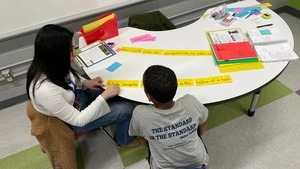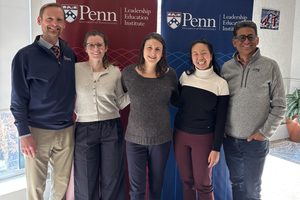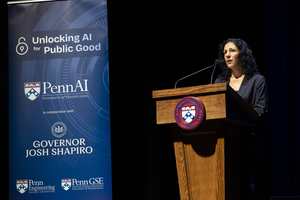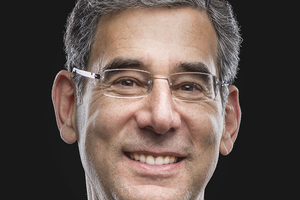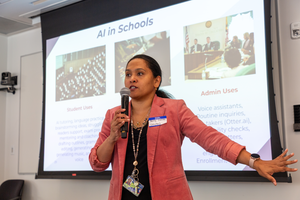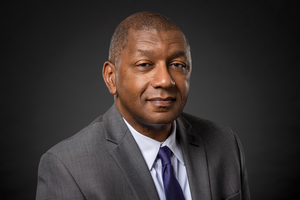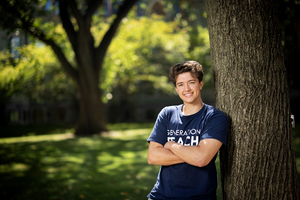When academic intervention is fun, engaging, and tailored just for them, students are ready, willing, and able to participate. That's the magic behind Penn GSE’s Tutoring Initiative. This innovative program connects Penn GSE-trained tutors with students from two Philadelphia-area schools, offering a dynamic blend of literacy and math support through interactive games and activities.
Students receive two 30-minute weekly tutoring sessions with Penn students and community members tailored to their skill level, areas of need for support, and interests. Young students receive support in counting, addition, and subtraction for math, as well as early reading and writing skills. No two learning plans are alike.
“Tutoring is one of the most evidence-based ways to help them catch up and support them, so the lessons are customized to what each child needs,” said Julie Berger, a Penn GSE alum and associate director of the Office of School and Community Engagement.
The Tutoring Initiative, launched in 2023, recently concluded its third semester supporting students in the School District of Philadelphia’s Henry C. Lea Elementary School, a K–8 school in the Walnut Hill neighborhood. In the spring 2024 semester, 64 tutors — including 37 GSE students — supported 77 students at Lea and 11 students at the Andrew Hamilton School in Cobbs Creek.
The program’s guiding light is to make academic support a positive experience. “We strive to be centered on joy as our ultimate goal,” said Berger.
Many elementary students are behind in critical math and literacy skills following the pandemic. Tutoring programs can help close the learning gaps. The program is successful on multiple levels: students look forward to their tutoring sessions, and their academic skills are improving.
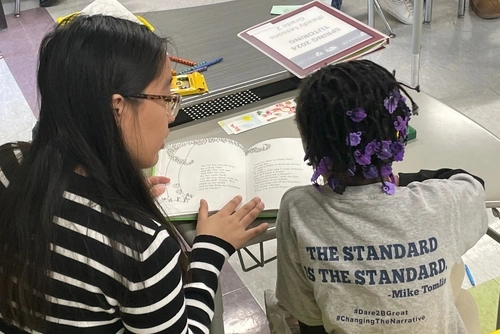
“If kids feel comfortable and safe, they’re open to trying something new or hard or difficult and find the joy in it,” said Leah Schatz, tutoring program coordinator and site supervisor at Lea.
However, the Tutoring Initiative isn’t a typical volunteer program; it is a research-backed academic intervention with a curriculum designed by Penn GSE experts. Tutors receive training and on-site support from Penn GSE professionals.
In creating the program, Berger and her colleagues leaned into research and best practices. They determined personalized, consistent tutoring with a healthy dose of fun is the most effective support. Half-hour sessions allow enough time for warm-ups, skilled practice, and breaks.
Penn GSE’s resident experts designed the curriculum. The Philadelphia Writing Project crafted the literacy program, and the Responsive Math Teaching program, led by Caroline Ebby and Joy Anderson-Davis, created the math component.
Tutors are recruited from the Penn community, but teaching experience is not required, as Penn GSE faculty and staff help train tutors on materials and strategies. One recent tutor is a pre-med student interested in pediatrics.
A trained reading specialist and Penn GSE alum, Schatz works full-time at Lea to oversee the tutors and design personalized tutoring plans for each student. She works closely with Lea teachers, instructional leaders, and administrators to ensure success.
Tutors balance instruction with fun, engaging activities, so much that kids forget they’re learning skills. Some students even share the classroom games with their parents so they can play at home.
Stephanie Juris, a first-grade teacher at Lea, says the program has a “profound impact” on their students.
“This program has proven incredibly successful for several reasons,” they said. “The Penn GSE tutors bring a wealth of knowledge and fresh perspectives that complement our teaching strategies, providing additional, catered support tailored to each student's needs.”
The Tutoring Initiative recently expanded to support middle schoolers, and Assistant Principal Kathryn-Anne Barney-Cheney says it’s already productive.
“I can see the confidence in middle school students increasingly growing with the tutoring program,” Barney-Cheney said.
As the program grows, organizers are beginning to collect and analyze data on outcomes. Berger said early signs are positive, with 80 percent showing overall growth.
Looking ahead, Berger and Schatz said they’d like to work with more School District of Philadelphia schools and create a model that other universities could launch in their communities. The program will resume in the fall 2024 semester.
“These sessions have become a cherished part of their school experience, helping them develop strong bonds with their tutors,” Juris said. “This relationship enhances their learning and boosts their confidence and enthusiasm for school.”
Media Inquiries
Penn GSE Communications is here to help reporters connect with the education experts they need.
